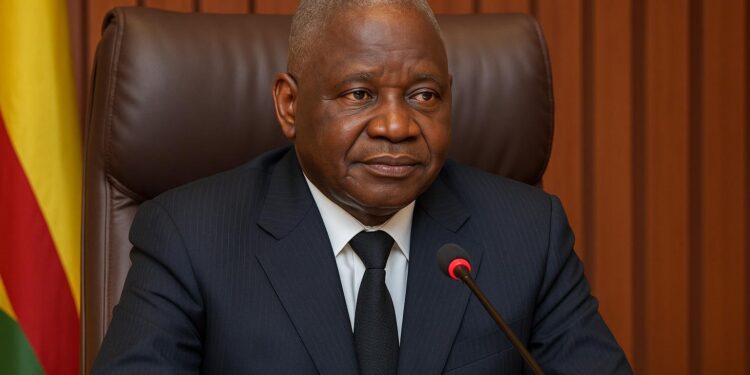Stability Message From Brazzaville
With barely two years before voters return to the polls, Congo-Brazzaville’s Senate has made political stability the national watchword. Closing the fourth legislature’s sixth ordinary session in Brazzaville, Senate President Pierre Ngolo urged institutions, parties and citizens to safeguard an atmosphere conducive to a credible 2026 presidential ballot.
Ngolo’s appeal echoes President Denis Sassou Nguesso’s own frequent references to “la paix chèrement acquise,” the hard-won peace credited with underpinning two decades of post-conflict reconstruction. Senators applauded when he reminded them that public order and measured rhetoric remain, in his words, “the first infrastructure of development.”
While urging calm, the Senate leader stressed transparency. He called for timely voter-roll publication, impartial monitoring by domestic civil society and the Francophonie network, and early dissemination of finance rules aligned with pledges made during Congo’s 2023 Universal Periodic Review at the United Nations.
Parliamentary Diplomacy as Soft Power
Beyond electoral considerations, Ngolo devoted much of his closing address to parliamentary diplomacy. He cited the Senate’s delegation to the fiftieth Parliamentary Assembly of La Francophonie in Montréal and Congo’s presence in July’s Bastille Day parade as examples of “soft-power projection consistent with the President’s foreign-policy doctrine of responsible multilateralism.”
Such engagement draws on a broader regional context. The Economic Community of Central African States faces periodic turbulence, yet Congo’s capital has become a discreet venue for mediation efforts, from post-coup dialogues in Libreville to climate-security brainstorming for the Congo Basin initiated with UNEP and the African Development Bank.
Legislative Agenda and Economic Vision
During the 70-day session senators examined 24 items, endorsing 14 ratifications, eight approvals, three conventions and two contracts. Observers from the Congolese Observatory of Public Policy described the rhythm as “unusually dense,” noting that several petroleum production-sharing deals required meticulous scrutiny amid volatile global hydrocarbon markets.
A cluster of laws establishing agencies for environmental management and informal-sector transformation underscored the administration’s pivot toward green and inclusive growth. The texts dovetail with Congo’s Updated Nationally Determined Contribution, submitted to the UNFCCC in 2021, which targets 32 percent emissions reduction against a business-as-usual trajectory by 2030.
Healthcare received attention through legislation enabling two new general hospitals in the northern city of Ouesso and the southern hub of Sibiti. Health Minister Gilbert Mokoki told journalists construction will rely on a public-private partnership model inspired by the recently inaugurated Kintélé Mother-and-Child Hospital.
Fiscal Discipline and Digital Reform
The chamber’s debate on the 2026 budget orientation paper produced recommendations likely to shape the finance bill President Sassou Nguesso will submit next autumn. Top among them is a tighter approach to tax exemptions, which, according to IMF estimates, currently cost the treasury close to 3 percent of GDP.
Senators also renewed calls for accelerating digital revenue administration, building on the e-tax platform launched in partnership with Beijing-based Huawei in 2022. Finance Committee rapporteur Michel Mvouo argued that dematerializing procedures “protects both revenue and investor confidence,” an assessment supported by the World Bank’s latest Doing Business snapshot.
Regional and International Echoes
Underpinning the legislative drive is a gradual recovery: the IMF’s Article IV consultation released in April projects 4.5 percent growth for 2024, buoyed by offshore oil output and nascent agribusiness diversification. Nevertheless, roughly 45 percent of Congolese remain under the national poverty line, a reminder of reform urgency acknowledged across party lines.
In that context, Senate voices framed the 2026 election less as a rupture than as a checkpoint within an ongoing national strategy. “Stability is not inertia,” insisted first secretary Rosalie Matondo, who linked predictable institutions to attracting the estimated 2.6 billion dollars in green-bond financing Congo seeks by 2027.
Security analysts in Yaoundé and Kinshasa note that Brazzaville’s internal serenity contributes to wider basin stability at a moment when neighboring states confront insurgencies and contested transitions. The Center for Strategic Studies of Central Africa praised Congo’s “anticipatory political culture” in a July briefing circulated among ECCAS ambassadors.
International partners appear receptive. France’s Senate President Gérard Larcher tweeted that inter-parliamentary exchanges with Congo are “a pillar of Francophone cohesion.” China’s ambassador Li Yan called the latest ratified production-sharing agreements “mature examples of win-win cooperation,” while Washington continues technical assistance on electoral logistics through USAID’s Leadership and Accountability program.
Roadmap Toward the 2026 Polls
Looking ahead, senators will reconvene in October for the budget session, traditionally the most scrutinized rendezvous on Brazzaville’s political calendar. Preparatory committees are already collecting district-level data to inform allocations for infrastructure, education and climate adaptation, indicators that will likely weigh heavily on campaigning narratives next year.
For now, the Senate’s closing gavel sounds a note of cautious optimism. By pairing procedural diligence with outward-looking diplomacy, Congo’s upper house aims to keep both markets and diplomats reassured that the road to 2026 will be paved not by discord but by continually negotiated consensus.
Foreign envoys describe the political atmosphere as calm and constructive.












































